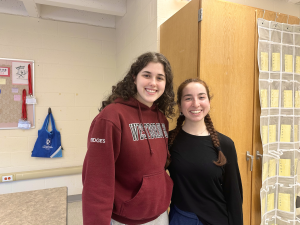Last year, beloved Journalism teacher, Mrs. Stoker resigned from her position at WHS to inspire a new group of students. At the MCI-Norfolk medium-security prison, Stoker is currently an adult secondary educator for around 40 incarcerated individuals, where she helps prepare them for their HiSET exam, a high school equivalency test.
After an incarcerated individual passes their HiSET they earn their high school diploma and 80 days are taken off their sentence. One option for students after passing the test is to apply for the Emerson or Boston University privately funded prison programs that are offered. Within these programs, incarcerated individuals are given the opportunity to work on special projects with some of the program’s teachers. Projects could include screenplays, poetry, or writing short stories.
Depending on their sentence length, many also chose to continue working in the prison. Alongside these educational programs, some may decide to participate in one of the few mental health programs as well, including violence reduction, or criminal thinking reduction.
Moving from a public school to a prison marked a major shift for Stoker. When describing the prison’s layout, she portrays the inside as a huge quad with buildings surrounding it including a school, community center, and gym. In order to enter the prison, she must go through several security checkpoints, a pat down included in the procedure. Stoker can only take in anything that fits in a small, clear bag such as a small chapstick or lotion, an empty water bottle, and her lunch in plastic bags.
However, as intimidating as it was, Stoker explains her initial reaction to the new environment, “I felt like that was the most daunting. Once I’m inside the prison, it actually looks like, which sounds funny, an all-boys prep school in New England.”
Stoker’s personal classroom inside the school is similar to a typical high school classroom. While it is not as big as a Westborough classroom, she does have tables, bookshelves, a big window, and posters hanging up. She does not have more than 12 students per class, as they need individual attention due to safety measures. Given that almost all students are members of a gang, it is important to not have too many men from rival gangs in the same class together to avoid conflict.
In her job, Stoker’s goal is to help rehabilitate the students. While it shares some similarities with teaching high schoolers, she notes a handful of differences too. For one, Stoker teaches students anywhere from the ages of 20 to 72 years old. In addition, the incarcerated individuals do not have the same freedoms that a high school student does as they do not have any computer or cell phone access and they do not have the ability to exit the prison and visit somewhere like Westborough TV.
Unfortunately, all of the incarcerated individuals come from traumatic pasts with preconceived notions about other people, leading Stoker to ensure that her students believe she is there to help. “I have to work very hard to earn their trust,” Stoker mentions, “I’m not going to do something to jeopardize their future. I’m truly there to choose to help them.”
Currently, Stoker’s favorite part has been interacting with the students. She comments, “They are just amazing human beings, which I know sounds weird because a lot of them are in for murder, drug-related crimes, robbery, fighting, etc. But, when you look past those crimes, which I’m still holding them accountable for, they’re really great people who are funny, compassionate, artistic, talented, and really were never given a chance.”
While she has the ability to look into the prison’s computer system to see what each of her students has done, she has chosen not to look at the reports to prevent bias towards any of her students. However, through some of their writings and conversations, students have mentioned murder, drunk driving, and gang warfare. Stoker reminds herself that, “Yes, that was what they did, and now they’re paying the price in terms of their loss of freedom.”
She continues to explain how since there is almost nothing to take in and out of the school for the students, it helps her separate her work from the rest of her life.
“I don’t have any grading to bring home. I don’t have any tests to correct. I don’t have parent emails- I don’t have any emails,” Stoker says, “So I now have this huge chunk of time back that I can spend with my family.”
In regards to the sentences of those in Norfolk prison, Stoker includes that a large number of guys are “lifers,” meaning they are sentenced to life in prison. At the same time, a lot of men are repeat offenders which means that they committed a crime, went to prison, left, and then committed another crime, landing them back in prison.
“That’s why education is so important to cut down on recidivism,” Stoker includes, “Some guys have been in two times, some have been in three times, but the goal is to get them out and back in society, which is really difficult because, on the outside, we don’t offer a lot of support for incarcerated individuals.”
One interaction in particular between Stoker and a student highlights the importance of motivation. “I had a student who passed his first two HiSETs, his reading and writing exams, and he was beyond excited. He said to me when I gave him his reports that he had passed, ‘I think I’m feeling happy,’ and I said, ‘I think you are.’ He genuinely was surprised at how he was responding to hearing he passed two tests.”
Shortly after the man got up and announced to the rest of the class, “I’m 42 years old. I haven’t been in class since I was in eighth grade, and I just passed two tests from putting in a lot of studying. If I can do it, any of you can do it.”
Most of the men that Stoker works with have completed up to ninth grade. Very few students have made it to junior year as they come from communities where they have had to decide to either join a gang or drop out of school in order to help financially support their families. In fact, Stoker has noticed that there are many brothers within the prison.
Unfortunately, due to systemic racism, it is common to see a student who will have had a parent in prison and even a grandparent. About 40% of the incarcerated individuals are white, around 55% identify as black or brown, and then a small portion identify as Asian, Asian American, or other. There tends to be a lot of men from communities such as Worcester, Springfield, Boston, Dorchester, New Bedford, Lowell, and Lawrence. All of which are cities in which students have not had the ability to thrive.
Thankfully, the prison is full of teachers who are incredibly focused on bettering their students who are each at different levels. There is an English teacher for individuals that don’t have English as their first language, and an adult basic education teacher for those adults at an elementary school level in reading, writing, math, etc.. Additionally, there is a pre-adult secondary education teacher for those with a middle school level of education, and finally, Stoker, an adult secondary education teacher, for students with a high school education level.
In addition, there is a computer teacher, barber program, and welding shop for incarcerated individuals to specialize in a field. Similar to WHS, the prison has a head teacher who acts similarly to a principal, as well as a guidance counselor. While it’s a small staff, Stoker says that they do work well together.
Despite the obvious differences, Stoker has taken the new opportunity with a positive mindset and has instilled that in all of her students. Although the transition between public school and prison is drastic, Stoker carries the lessons she has learned through her years of teaching journalism.
“Something I continue to learn in prison is the importance of not coming in with a preconceived notion. That transfers to whenever you’re interviewing someone or you’re researching a topic to write about, to try to really go in open-minded. I just continue to realize how much we’re all humans, no matter what we’ve done, for better or for worse. I have taken my maximize the truth, minimize harm mantra right into prison, and I continue to realize how important it is to represent all voices.”














